How To Start Branding Yourself Online
Today it's more important than ever to learn how to start branding yourself online.
Over 1 billion names are googled every single day - so unless you live in a cave, someone has looked you up. What people find out about you online determines big decisions - like whether or not to do business with you!
45% of US adults that googled a potential partner found something in an online search that made them decide not to do business with that person.
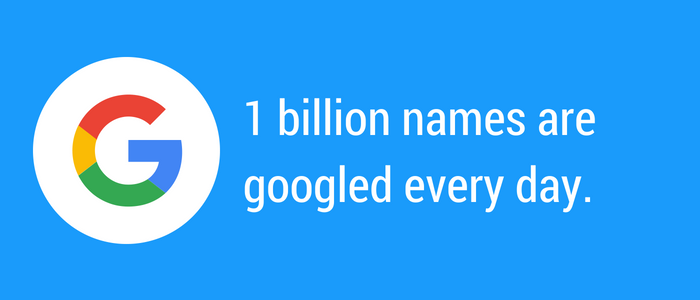
While that is reason enough to clean up your online presence, keep in mind that 56% of those people have found something that solidified their decision to do business with someone. Branding yourself (or choosing not to) can have a serious impact on your professional relationships.
If you’re applying to college, interviewing for a job, aiming for a promotion or simply going out on a first date, then your online presence has the power to help or hurt the outcome. By learning how to brand yourself you can make it the former, not the latter.
If you want results quickly:
If you aren’t interested in learning the nitty-gritty of best practices of how to brand yourself and instead just want to get started fast, sign up for our free reputation management software.
It walks users through the process of scanning, auditing, monitoring and improving their online presence. It’s the fastest way you can start branding yourself online without having to invest a lot of time or money in the process.
If you don’t have the time to handle things yourself, contact a Reputation Advisor to discuss your options with our Managed Services team.
Our Managed Services department is home to top-notch content creators, web developers, social media managers, writers and brand strategists. Not only will they show you how to brand yourself, but they’ll do all of the work for you.
If you want to learn more about branding yourself online and how the process works from start to finish, read on!
How To Brand Yourself
Understanding how to brand yourself online begins with uncovering your brand.
Your brand is not a tagline or an ad campaign. It's a combination of your interests, beliefs, values, talents, skills - and everything else that makes you unique.
When it comes to figuring out how to brand yourself, start with the descriptors that you're known for - according to others and yourself.
If, "Bob is such a diligent worker and whip smart" is something that you’ve actually heard people say about you - add that to your list! Ask other people that you trust how they would describe you (if you’re comfortable doing so).
What are the characteristics that keep coming up when you ask this question? Do you agree with these descriptions? Whatever the case may be, make sure that you write down how others describe you.
Even if you don’t use these descriptors right away, over time you’ll start to weave these into the tapestry of your brand.
Once you discover and identify your personal brand, you'll be ready to learn how to brand yourself.
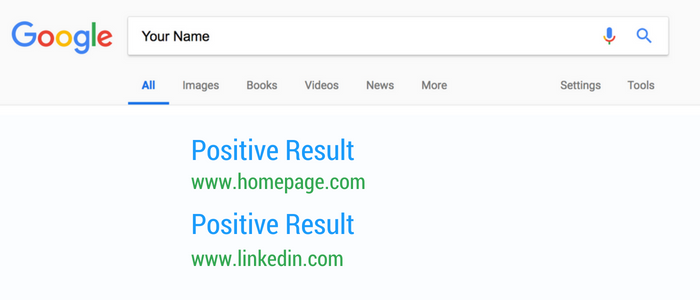
1. Uncover your brand
The first step when it comes to identifying how to brand yourself online is uncovering your brand. This is a key component to making sure that you are represented positively and accurately online.
Branding yourself is not an act or a show you put on for others. Your brand reflects who you are at your core. The qualities that define you as a person should shape your brand too. These attributes are unmistakable.
If I asked ten members of your family how they would describe you, they would likely describe you by using a few key words. Identifying the heart of who you are is key when undergoing the process of branding yourself appropriately.
To help you in this self-discovery phase, here are a few questions to ask yourself:
- What are my biggest strengths?
- What am I most passionate about?
- What makes me unique?
If these questions seem overwhelming, think about them in specific contexts.
Consider them in relation to your current job. How does your answer change when you think about your family life? What are your answers as a student? How do your feelings today compare to how you would have answered ten years ago?
While there may be some major differences depending on the context, you’ll probably see some similarities and patterns emerge. Look for the commonalities and let that frame the bigger picture.
Roll up your sleeves and dig deep inside to find the substance that makes you uniquely you. Once you’ve done that, you're halfway there. Understanding who you are is the jumping off point for the entire process of branding yourself.
Reflecting on these kinds of questions then use our software to scan, audit, monitor and learn how to brand yourself online based on who you are.
The software helps users understand the major steps needed to build a strong foundation for their brand. Our cutting-edge technology identifies a Reputation Score for users based on how they currently look online. This score relates directly to how much their online presence is helping or hurting their professional opportunities.
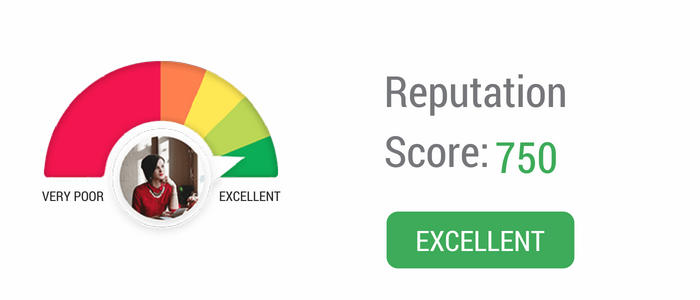
2. Build your brand’s foundation
Now that you’ve spent some time thinking about who you are and what your brand should say about you, it’s time to incorporate that into the actual construction of your online brand.
Start to build an online presence that reinforces your qualifications on platforms where you know that people will want to connect with you. Consider these points while working on your property’s foundation:
- Determine the best way to position your brand online in your industry
- Research successful individuals in your field and familiarize yourself with their branding strategies
- Look at these leaders for inspiration and consider how you are similar and different from them
- Build an online presence that highlights your expertise and makes it easy for people to get in touch with you
- Make sure people find your online presence when you get looked up
- Monitor the web for damaging content
- Actively build your brand to protect it from future threats, and mitigate the impact of damaging results by reacting quickly and strategically
These concepts should stay top of mind as you work on your strategy and build out your foundational online profiles and website.
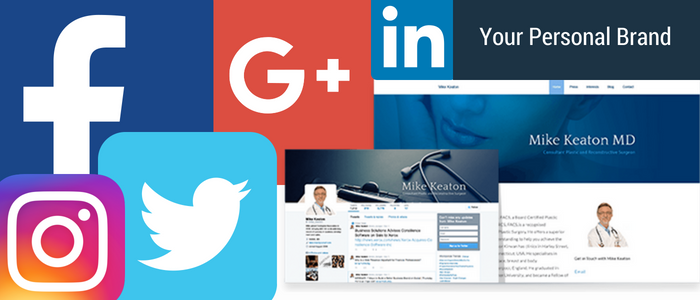
In terms of the actual profiles that you should build, we recommend that you follow the prompts in our free software. You should also read through other guides on our blog for an in-depth look at how to start branding yourself.
Pay particular attention to our guides such as this one that show you how to create a brand that represents you, but is also optimized well so it ranks in search engines for your name.
Remember to start with strong platforms that tend to rank well such as: LinkedIn, Twitter, Facebook, Google plus and any other sites that are relevant in your field. While you will definitely need to build more than 5 profiles, focus your attention on those listed to get started.
3. Develop a credible brand
Once you’ve articulated your brand, (those authentic qualities and characteristics that make you unique), focus on credibility and building your audience.
Creating a strong foundation of sites and profiles that showcase your assets and provide a meaningful user experience is a must. But in terms of branding yourself effectively - you need an audience.
Credibility is the first step in establishing that audience. If people don’t trust what you have to say, then they aren’t going to engage with your work or help you find new professional opportunities.
Branding yourself effectively can be boiled down to simply seeking out ways to demonstrate your credibility. Eliciting trust from others is critical when finding and building the right community around your name and presence online.
Your brand’s credibility
Conveying credibility to those who visit your sites and profiles is not as difficult as you may think when it comes to branding yourself online. We suggest that you follow these steps for the best outcome:
- Create highly customized content
- Publish brand-strengthening content
- Demonstrate that you are active in your field
- Take your spot as a thought leader
- Partner with thought leaders, influencers and gatekeepers in your industry
- Get your content published or syndicated on other trusted sites
Put your energy towards publishing highly-tailored blog posts, social media updates, videos and presentations that put your best foot forward online. You should be creating, sharing and publishing content that will engage and attract the right people to your brand.
Focus your resources on researching and developing content that speaks directly to your areas of expertise and passion. There’s a good chance that this kind of content will be useful to others in your industry including colleagues at your level as well as to those who are just starting out.
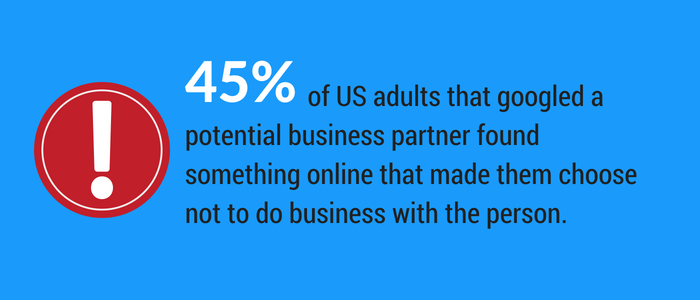
Create content that matters, and share it on respected platforms where your target audience is already pretty engaged.
Your credibility rests on the quality and relevance of what you share with others. However, as we mentioned before, it also depends on the endorsements of other trusted individuals and sources in your industry.
It’s up to you to identify the gatekeepers, influencers, leaders, advocates and allies in your field. Luckily for you, this doesn’t have to be time-consuming.
A brief google search will yield the top 10, 20, 50, 100 (etc) most successful people in your industry. From there you can follow them on various social media outlets.
You can also look for influencers who may have a smaller audience, but a highly engaged following. By aligning yourself with established leaders in your field (even in small ways), some of their credibility rubs off on you. They’ll also expose you to an audience that wants to hear what you have to say. It’s up to you to choose and pursue wisely.
Remember, the opposite can be true too. If you align yourself with non-credible people or sources, that will negatively reflect back onto you. You would be surprised by the number of people who know the basics of how to brand yourself, but sabotage themselves in this way.
So always do your homework before partnering with someone to gain more credibility and increase the size of your audience.
Identifying your target market and building your audience
Talking about “target markets” may seem a little advanced - especially if you’re still figuring out the basics of branding yourself. But don’t worry, the idea isn’t that complicated. In this case, “target markets” just means the people that will be interested in what you have to say.
If you are actively selling a product or service, a “target market” describes the people that you want as customers and clients.
In the case of a highschool student applying to colleges, their “target market” likely includes admissions counselors, scholarship boards, athletic recruiters and even fellow students with similar interests.
A potential employer, professional colleagues and experts in your field are likely your target market if you’re applying for jobs.
By pinpointing your target market (or audience), you can position your talents and skill-sets to land that dream job, close that sale or accomplish any other stated goal.

To capture or engage your target audience, follow these steps. And if you’re not selling a product or service, think of your personal brand as the product, and professional or academic opportunities as the end goal:
Determine Your Target:
Before you can build content for your audience, you need to clearly identify your target. Start by asking yourself the following questions:
- Who do I think needs to know about my product, services or personal brand? Why do I think that’s my target?
- Who do I think would be interested in using my product (or interacting with my online brand)? Why do I think that’s the case?
- Of these “need to know” and “would be interested” groups, how many would actually be willing to shell out money for my product or service?
- Who would be willing to help me further develop my online brand and present me with professional or academic opportunities? How can I better understand that cross section of my audience?
Focus first on those individuals and/or businesses that possess the pain points that you specifically can solve. Once you have identified these people, build your strategy with this particular niche in mind.
If you are applying to schools, think of some of the pain points of the admissions officers. They’re trying to wade through the “no’s” as quickly as possible to get to the best fits for the incoming class.
While your brand shouldn’t fully cater to what you think an admissions counselor is looking for, by branding yourself effectively you’ll give them a better picture of who you are and why they should absolutely accept you.
The same is true when applying to jobs. What do you want HR and a potential boss to know about you? Showcase the assets that demonstrate that you’re the best person for the job.
Approach the process of branding yourself as a chance for you to highlight your best self, share valuable content by engaging in thought leadership, and compel potential employers to hire you.
Use all the tools at your disposal to better understand your existing audience and your target markets. For example, our software helps you take that first step by showing you who's googling and finding you online.
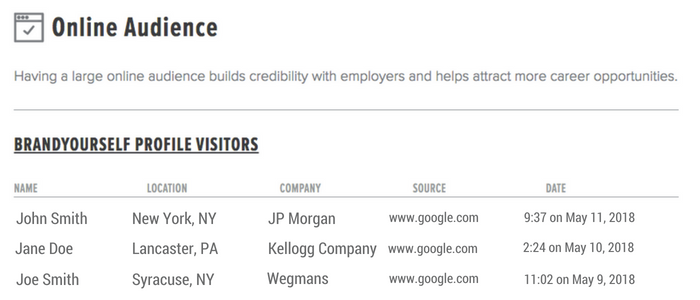
Identify your competition:
Understanding your competition is absolutely essential when branding yourself. Through understanding your competitors' core competencies, you are better able to position your abilities to fit your audience's needs.
You must understand your competitors in order to differentiate yourself from them and to find gaps in what they offer that you can fill with your own skills. This can range to anything from business, the job search or getting into your dream school.
By paying close attention to your competitors, you can ultimately provide a compelling sales pitch on why your target audience should choose you over anyone else.
Create a brand statement:
Based on the above steps, create a 1-2 sentence "brand statement" that encompasses who you are, what you do, and how you are different. Use these personal brand statement tips.
If you want to take things a little further, look into learning how to write a personal mission statement as well!
Strategically build an audience to amplify your opportunities:
Build an audience and promote your content to them so opportunities start coming to you rather than the other way around.
Nurture your network:
You should consistently engage your audience via social media. Provide and curate relevant content for your audience that highlights your expertise. A blog is one of the most effective ways for creating this type of "expert" content and branding yourself.
With the right platform you are able to disseminate this content to your audience with one click. Building a platform (such as a blog) and nurturing a community are rocket fuel for your brand.
4. Create a communication plan to target opportunities
Fortunately, there are dozens, if not hundreds of social profiles and online platforms that you can use to start branding yourself online. In the last ten years, social media has evened the playing field by allowing "everyday Joes" to reach their audiences at multiple touch-points, with various tools at their disposal.
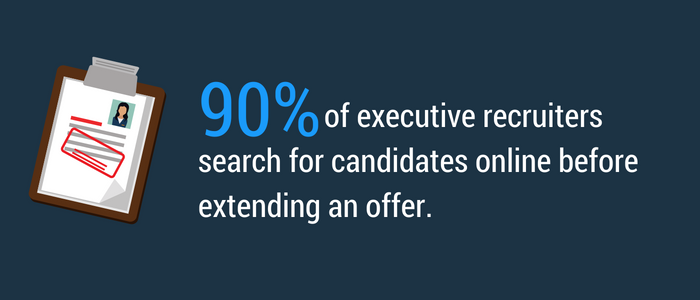
This vast quantity of resources can actually become overwhelming if you’re learning how to brand yourself.
Figuring out which platforms are right for you can be difficult and time-consuming, especially considering the endless methods and platforms at your disposal to reach your target audience.
We built our software with simplicity in mind.
It walks you through each step of the process, including setting up the most relevant social media profiles and optimizing them to make sure they show up high when people search for your brand online.
It also helps you promote your brand in all the right places by making sure that you leverage your position and content as a thought leader to find speaking, press and career opportunities.
Control Your Online Presence
Now that you understand the fundamentals of branding yourself, let’s talk about how that translates to controlling your online presence.
When your brand is searched online, you should appear in search results. Without an online presence, or worse, a presence that is less than desirable, everyone who looks for you will likely have an inaccurate first impression.
If future bosses, colleagues, clients and customers are searching for you online, and you're not showing up in the search results, you're already behind the eight ball... without even knowing it!
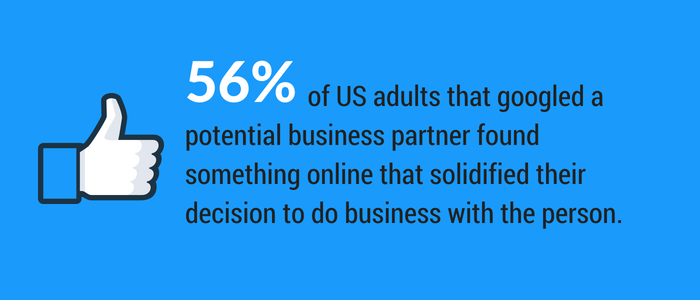
If what you find on Google is irrelevant or not you, then you should definitely take some time to learn more about online reputation management.
In short, your goal is to fill the first page of Google with as many positive results as possible. Depending on your web history, here are the best treatment options.
1. I don't have a web presence
The first thing you need to do to start branding yourself is to create the foundation for your online presence. That means creating profiles on sites that rank high in search engines.
The top sites to start with are LinkedIn, Facebook, and Twitter.
While these profiles tend to rank high on their own, you must optimize them for search engines to get the most out of them. This part can take some time, but if you follow the steps in our software it will be straightforward and easy.
2. I have specific content I want to push up higher
You might already have a personal website, a LinkedIn profile, or other content you want people to find when they search for you, but they just aren't showing up high enough.
If this describes you, then you are going to need to learn some of the ins and outs of personal search engine optimization. Also, if you get set up with a free BrandYourself account that will be handled for you as well. If you don’t have time to learn or just want to get right into the action, that’s a great place to start.
3. I have specific content I want to BURY
Perhaps you have something unflattering out there about you, or you're also being mistaken for an ex-con. Unfortunately, you can't simply remove a result from search engines because you don’t like it.
The only way to get rid of a negative result is to suppress that result with positive links. Site owners aren't required to remove it - in fact the law is on their side to keep it up in many cases. (And even if they remove it, it can still be archived elsewhere and may continue to show up).
If this is the case we highly recommend that you sign up for our online reputation management software, or speak to a Reputation Advisor about our managed service options (if you don’t have the time to do the work yourself).
Where To Go From Here
As you can see, there is a lot of work involved in understanding how to brand yourself and actively manage the process of branding yourself as well. However, it’s something that needs to be done.
Today, it is just plain irresponsible to be passive about branding yourself.
You spend so much time building your reputation in real life, why not apply that same discipline to your online presence?
The data speaks for itself, people who have a weak or negative online presence lose professional, academic and personal opportunities. Think about it, your potential earned income is severely impacted by how you present yourself online.
That's why we offer tools and services make the process of branding yourself easier, more fun, and less time-consuming.
Using our software and services is the easiest way to make sure others find polished content about you online when they look you up.
BrandYourself serves as the hub of your branding efforts by building positive content in search engines around your name. This positive content can help you bury any unwanted or irrelevant results. Our web-based software is intuitive and simple.
Sign up for a free reputation management software account now to make sure you look great when employers, clients and even dates google you. And for the help of our in-house team of branding experts, give us a call us at (646) 863-8226 or schedule a complimentary consultation with a Reputation Advisor today.